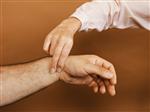 |
 |
 |
||
    |
||||
|
||||

Experts find gene trigger for deadly skin cancer
|
|
Reuters Health
Monday, April 6, 2009

The discovery could lead to better treatments for the most deadly form of skin cancer after scientists at Britain's Institute of Cancer Research established the BRAF gene mutation is often the first event in the cascade of genetic changes leading to melanoma.
Scientists already knew the BRAF gene was frequently damaged in patients with melanoma, but it was unclear if this was a cause or effect of the cancer.
The British institute published its findings in the journal Cancer Cell.
"Our study shows that the genetic damage of BRAF is the first step in skin cancer development," said lead author Richard Marais. "Understanding this process will help us develop more effective treatments for the disease."
The hope is that knowing the genetics behind skin cancer will lead to the development of targeted drugs that can fix the faulty genetic machinery.
While melanoma accounts for only a small percentage of skin cancers, it is responsible for most skin cancer deaths. The disease is characterized by the uncontrolled proliferation of pigment-producing skin cells called melanocytes.
Over-exposure to sunlight is to blame for at least two-thirds of cases as DNA in sunburnt skin cells becomes damaged, leading to the genetic mutations.
(Reporting by Ben Hirschler, editing by Farah Master)
Reuters Health
© 2009 Thomson Reuters. All rights reserved. Reuters content is the intellectual property of Thomson Reuters or its third party content providers. Any copying, republication or redistribution of Reuters content, including by framing or similar means, is expressly prohibited without the prior written consent of Thomson Reuters. Thomson Reuters shall not be liable for any errors or delays in content, or for any actions taken in reliance thereon. "Reuters" and the Reuters Logo are trademarks of Thomson Reuters and its affiliated companies. For additional information on other Reuters media services please visit http://about.reuters.com/media/.
Related News:
More News on this Date
Related MedlinePlus Pages:
| Home | Health Topics | Drugs & Supplements | Encyclopedia | Dictionary | News | Directories | Other Resources | |
| Disclaimers | Copyright | Privacy | Accessibility | Quality Guidelines U.S. National Library of Medicine, 8600 Rockville Pike, Bethesda, MD 20894 National Institutes of Health | Department of Health & Human Services |
Date last updated: 07 April 2009 |
